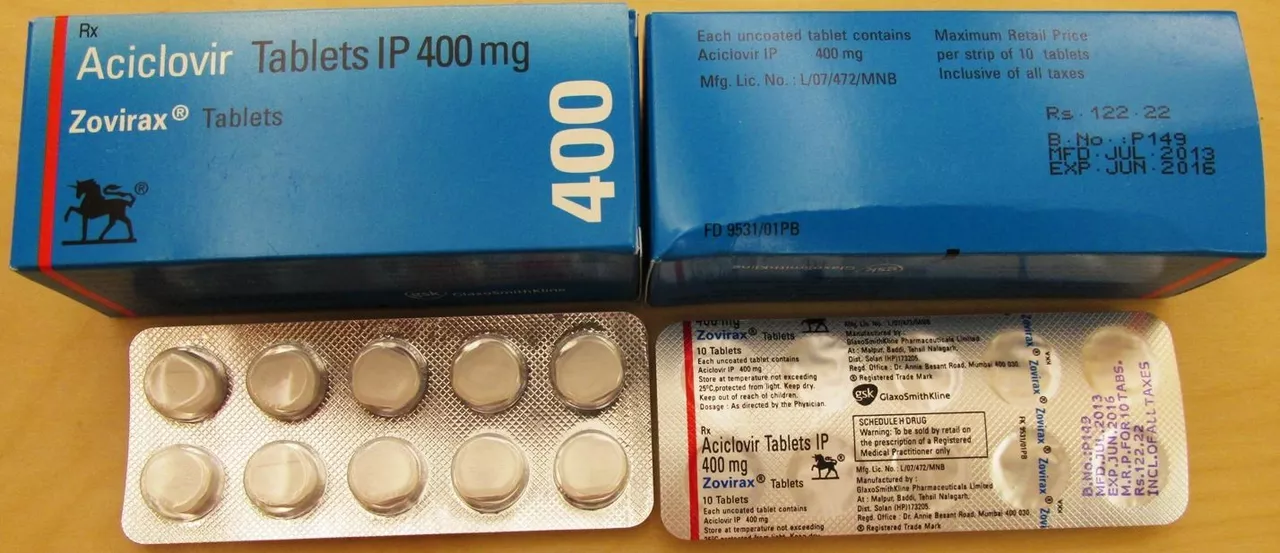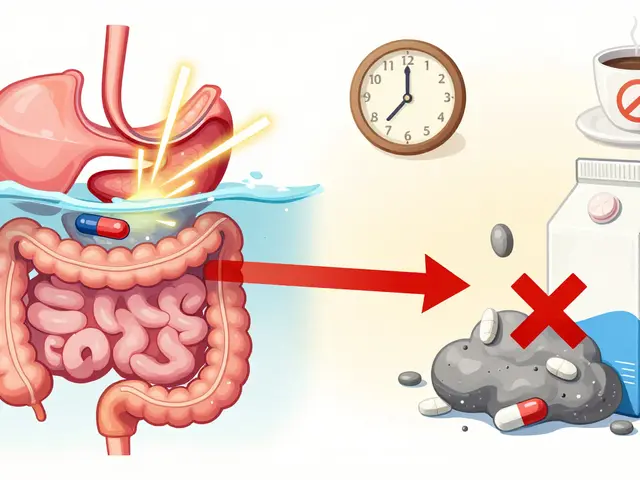
Introduction to Acyclovir
Acyclovir is an antiviral drug that has been around for quite some time. It has proven to be a game-changer in the treatment of viral infections, particularly those caused by the herpes simplex virus (HSV) and varicella-zoster virus (VZV). In this comprehensive guide, we will explore the many uses and benefits of acyclovir, providing you with a better understanding of how this medication can help you or your loved ones.
Understanding the Mode of Action
Before we delve into the various uses of acyclovir, let's first understand how it works. Acyclovir is a nucleoside analogue, which means that it mimics the structure of the building blocks of DNA. Once it enters the body, the drug is converted into its active form, acyclovir triphosphate, by the virus's own enzymes. This active form then inhibits the virus's DNA synthesis, preventing it from reproducing and ultimately stopping the infection in its tracks. This is why acyclovir is so effective in treating viral infections.
Treating Cold Sores and Genital Herpes
One of the most common uses of acyclovir is for the treatment of cold sores and genital herpes, both of which are caused by the herpes simplex virus (HSV). Acyclovir can be taken orally or applied topically as a cream or ointment, depending on the severity and location of the infection. When taken at the first sign of a cold sore or genital herpes outbreak, acyclovir can significantly reduce the duration and severity of symptoms, helping you get back to feeling like yourself in no time.
Managing Shingles and Chickenpox
Another major use of acyclovir is in the treatment of shingles and chickenpox, both of which are caused by the varicella-zoster virus (VZV). Shingles is a painful rash that occurs when the dormant VZV is reactivated in the body, while chickenpox is a highly contagious illness that typically affects children. Acyclovir can help to reduce the severity and duration of symptoms associated with both shingles and chickenpox, making the recovery process much more manageable.
Preventing Viral Infections in High-Risk Individuals
Acyclovir is not only used to treat viral infections but can also be prescribed as a preventive measure for individuals who are at a high risk of developing these infections. This includes people with weakened immune systems, such as those undergoing chemotherapy, organ transplant recipients, or individuals with HIV. By taking acyclovir regularly, these high-risk individuals can significantly reduce their chances of contracting a viral infection, protecting their overall health and well-being.
Reducing the Risk of Viral Transmission
Another important benefit of acyclovir is its ability to reduce the risk of transmitting the herpes simplex virus to others. By suppressing the virus's replication, acyclovir can help to minimize the shedding of the virus, making it less likely that an infected individual will pass the virus on to their partner. This is particularly important for individuals with genital herpes, as it can help to prevent the spread of the virus and reduce the overall prevalence of the infection in the population.
Acyclovir and Pregnancy
For pregnant women who have a history of genital herpes, acyclovir can be a lifesaver. The medication can be used to prevent outbreaks during pregnancy, reducing the risk of transmitting the virus to the baby during childbirth. This is crucial, as neonatal herpes can be a serious and potentially life-threatening condition. If you're pregnant and have a history of genital herpes, be sure to discuss your options with your healthcare provider to ensure the safety of both you and your baby.
Potential Side Effects of Acyclovir
As with any medication, acyclovir does come with some potential side effects. These can include nausea, vomiting, diarrhea, headache, and fatigue. In most cases, these side effects are mild and manageable, but it's important to discuss any concerns with your healthcare provider. In rare cases, acyclovir can cause more serious side effects, such as kidney problems or an allergic reaction. If you experience any severe or concerning side effects, be sure to seek medical attention immediately.
Drug Interactions and Precautions
When taking acyclovir, it's important to be aware of any potential drug interactions or precautions. Certain medications, such as probenecid or other antiviral drugs, can interact with acyclovir and affect its efficacy or increase the risk of side effects. If you're taking any other medications, be sure to discuss this with your healthcare provider to ensure the safe and effective use of acyclovir. Additionally, it's important to stay well-hydrated while taking acyclovir, as this can help to prevent the development of kidney problems.
Conclusion
In conclusion, acyclovir is a highly effective antiviral medication with a wide range of uses and benefits. From treating cold sores and genital herpes to managing shingles and chickenpox, acyclovir can help to reduce the severity and duration of symptoms, making the recovery process more manageable. Additionally, acyclovir can be used as a preventive measure for high-risk individuals and can even help to reduce the risk of viral transmission. If you or a loved one are suffering from a viral infection, be sure to speak with your healthcare provider about the potential benefits of acyclovir.






6 Comments
Reading through the guide kinda makes you step back and think about how far we’ve come with antivirals. It’s wild that a drug from the ‘80s still does the heavy lifting for HSV and VZV. I guess the real win is seeing it used both as treatment and as a preventive in immunocompromised folks. The piece does a solid job laying out the basics without drowning you in jargon, which is refreshing. All in all, it’s a good reminder that sometimes old‑school meds still rule the roost.
This is exactly what the medical community should be pushing for.
Wow, look at the naiveté-thinking a single pill can solve society’s moral decay. Sure, acyclovir stops viral replication, but it won’t fix the deeper issues like reckless behavior or the lack of proper education. It’s almost comical how some people treat pharma as a silver bullet while ignoring personal responsibility. If we keep glorifying drugs without tackling the root causes, we’re just putting a band‑aid on a broken system.
i think the part about sideeffects is to short. alot of peopel get nausea or headache and sometimes the drug can cause kidney problemes if they dont dRink enough water. also, it shouls be mentioned that some ppl may have allergic reactions that look like rashes or swelling.
Hey, thanks for pointing that out! Yeah, staying hydrated is super important, especially if you're on a high dose. And just a heads‑up, if you notice any weird rash, call your doc pronto. Hope that helps!
From a pharmacological perspective, acyclovir is a nucleoside analogue that undergoes a three‑step phosphorylation cascade-first by viral thymidine kinase, then by host cellular kinases-to become the active triphosphate form that competitively inhibits viral DNA polymerase; this mechanism not only halts viral DNA elongation but also reduces the frequency of viral shedding, which is clinically significant in reducing transmission risk. In practice, the drug’s bioavailability varies considerably with formulation: oral tablets exhibit approximately 15‑30 % systemic absorption, whereas topical preparations achieve high local concentrations with minimal systemic exposure-a factor clinicians weigh when selecting therapy for mucocutaneous lesions versus systemic disease. Moreover, pharmacokinetic parameters such as half‑life (approximately 2.5–3 hours in renal‑competent patients) necessitate dosing adjustments in individuals with compromised renal function to avoid accumulation and potential nephrotoxicity. The therapeutic index is relatively wide, yet caution is warranted in patients receiving concomitant nephrotoxic agents (e.g., amphotericin B, aminoglycosides) or those with pre‑existing renal insufficiency; dose reduction or interval extension is standard in such scenarios. Acyclovir’s side‑effect profile is generally mild-headache, nausea, and fatigue predominate-but severe adverse events (acute interstitial nephritis, crystal‑induced nephropathy, Stevens‑Johnson syndrome) have been reported, primarily in the context of high‑dose intravenous therapy or dehydration. Hydration is, therefore, a simple yet effective prophylactic measure; encouraging patients to maintain a fluid intake of at least 2 L/day can markedly reduce the risk of crystal precipitation within renal tubules. Drug‑drug interactions are relatively few, though co‑administration with probenecid can potentiate plasma concentrations by decreasing renal clearance, which may be therapeutically advantageous in certain cases but also raises toxicity concerns. In immunocompromised hosts-such as organ transplant recipients, patients undergoing cytotoxic chemotherapy, or individuals with advanced HIV infection-prophylactic acyclovir regimens (often 400 mg twice daily) have demonstrated efficacy in reducing the incidence of HSV reactivation and VZV‑related complications; adherence to such regimens is crucial for maximizing prophylactic benefit. Lastly, special populations warrant particular attention: while acyclovir is classified as Pregnancy Category B (no evidence of risk in animal studies and inadequate human data), clinical guidelines endorse its use when the therapeutic benefit outweighs potential fetal risk, especially for preventing neonatal herpes transmission during delivery. In summary, acyclovir remains a cornerstone antiviral with a well‑characterized mechanism, a tolerable safety profile, and versatile applications across both treatment and prophylaxis; appropriate dosing, vigilant monitoring of renal function, and patient education on hydration and adherence are essential components of optimal clinical use.